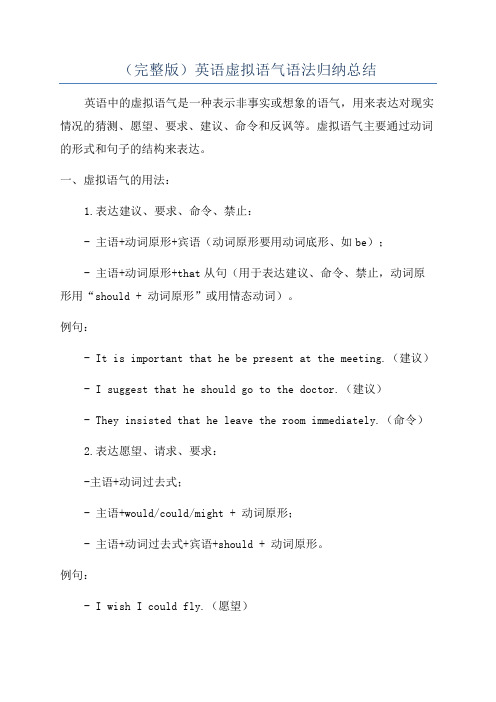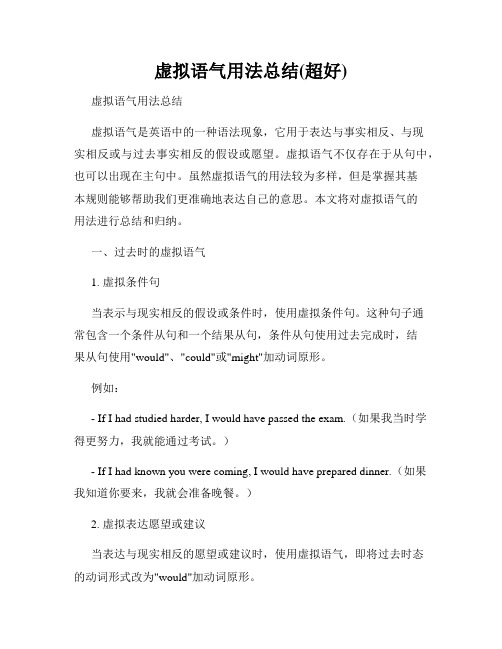虚拟语气的用法小结
虚拟语气用法归纳

虚拟语气用法归纳虚拟语气是一种特殊的语法形式,用来表示说话人所表达的事实并非真实的情况。
虚拟语气通常用于陈述某种假设、愿望、建议或推测。
在英语中,虚拟语气可以用于多种句型和场景中。
以下是关于虚拟语气的一些常见用法归纳:1. 条件句虚拟语气经常用于表示条件句中的不可能或未实现的情况。
在条件句中,主句和从句之间通常以if连接,其中的动词使用虚拟语气形式,即用过去式或过去完成式表示未来或现在的假设情况。
例如:"If I were you, I would go to bed early."(如果我是你,我会早点上床。
)2. 虚拟愿望虚拟语气还可以用于表达愿望或对现实情况的怀疑。
在这种情况下,常用的句型是"if only"或"would rather"等。
例如:"Ifonly I had more money, I would travel the world."(要是我有更多的钱,我就会周游世界。
)"I would rather you went with me."(我宁愿你和我一起去。
)3. 动词要求有些动词,如命令、建议、要求等,常常要求其后的从句使用虚拟语气。
这些动词包括:recommend(推荐)、insist(坚持)、demand(要求)、require(要求)、suggest(建议)等。
例如:"She insisted that he be on time for the meeting."(她坚持要求他准时参加会议。
)4. 形容词和名词后接从句有时,形容词或名词后接从句时,从句中的谓语动词要使用虚拟语气。
这种情况通常表示说话人对从句所表达的内容的怀疑或不同意。
例如:"It is important that he study hard for the exam."(他认真备考这个考试很重要。
(完整版)英语虚拟语气语法归纳总结

(完整版)英语虚拟语气语法归纳总结英语中的虚拟语气是一种表示非事实或想象的语气,用来表达对现实情况的猜测、愿望、要求、建议、命令和反讽等。
虚拟语气主要通过动词的形式和句子的结构来表达。
一、虚拟语气的用法:1.表达建议、要求、命令、禁止:- 主语+动词原形+宾语(动词原形要用动词底形、如be);- 主语+动词原形+that从句(用于表达建议、命令、禁止,动词原形用“should + 动词原形”或用情态动词)。
例句:- It is important that he be present at the meeting.(建议)- I suggest that he should go to the doctor.(建议)- They insisted that he leave the room immediately.(命令)2.表达愿望、请求、要求:-主语+动词过去式;- 主语+would/could/might + 动词原形;- 主语+动词过去式+宾语+should + 动词原形。
例句:- I wish I could fly.(愿望)- I would appreciate it if you could help me.(请求)3.表示虚拟条件:- If条件从句中的谓语动词用过去完成时,主句用would/should/might/could + have + 过去分词;- If条件从句中的谓语动词用过去时,主句用would/should/could + 动词原形。
例句:- If I had known his phone number, I would have called him.(虚拟条件)- If you had listened to me, we could have finished the project earlier.(虚拟条件)4.表达建议、要求、祝愿:- If only内部称述 + 主语 + 过去式。
虚拟语气的用法归纳

虚拟语气是一种特殊的动词形式,用来表达说话人的假设、愿望、猜测、建议等非现实的情况。
虚拟语气在英语中的使用非常广泛,包括情态动词、动词的过去式、过去完成时、be 型虚拟式等形式。
下面我将详细介绍虚拟语气的用法。
一、情态动词的虚拟语气1. 表示现在或将来的假设例如:If I had money, I would travel around the world.2. 表示过去的假设例如:If I had studied harder, I would have passed the exam.3. 表示与现在事实相反的愿望例如:I wish I were rich.4. 表示与过去事实相反的愿望例如:I wish I had studied harder.5. 表示与将来事实可能相反的愿望例如:I wish it would stop raining.二、动词的过去式的虚拟语气1. 表示现在或将来的假设例如:If I knew the answer, I would tell you.2. 表示过去的假设例如:If I had seen the movie, I would have recommended it to you.三、过去完成时的虚拟语气1. 表示过去的假设例如:If I had had more time, I would have finished the work.2. 表示与过去事实相反的愿望例如:I wish I had gone to the party last night.四、be型虚拟式1. 表示现在或将来的假设例如:If I were you, I would take the job.2. 表示与现在事实相反的愿望例如:I wish I were in Hawaii now.五、混合虚拟语气1. 表示过去的假设例如:If I had known that you were coming, I would have met you at the airport.2. 表示与过去事实相反的愿望例如:I wish I had studied harder and passed the exam.六、虚拟语气的特殊用法1. 在某些形容词后面使用虚拟语气例如:It is important that you be on time.2. 在某些名词后面使用虚拟语气例如:It is necessary that he study harder.3. 在某些介词后面使用虚拟语气例如:I am glad that you came.以上是虚拟语气的用法归纳,希望对大家有所帮助。
虚拟语气的用法总结

虚拟语气的用法总结以下是小编为大家总结的虚拟语气的用法,希望能帮助大家更好地掌握英语中虚拟语气的用法,提高英语水平。
一、虚拟语气的使用范围:虚拟语气用来表示说话人所说的话并不是事实,而是一种假设、愿望、怀疑或推测。
该语法主要用于if 条件状语从句中,也可用于主语从句、表语从句和宾语从句等。
二、虚拟语气的判断:1. if 条件状语从句中虚拟语气的判断。
if 条件状语从句有真实条件句和非真实条件句。
假设条件可以实现的句子为真实条件句,反之为非真实条件句,要用虚拟语气。
其形式分为以下三种:(1) 与过去事实相反的假设。
结构为:从句的谓语动词用“had + 过去分词”,主句用“should (would, could, might) + have + 过去分词”。
例如:If it had not rained so hard yesterday, we could have played tennis. 如果昨天没有下大雨,我们就能玩网球了。
(2) 与现在事实相反的假设。
结构为:从句的谓语动词用过去式,系动词用were,主句的谓语用“should (would, could, might) + 动词原形”。
例如:If I were in your position, I would marry her. 如果我是你,我就娶她为妻。
(3) 与将来事实相反的假设。
结构为:从句的谓语动词用“should (were to) + 动词原形”,主句用“should(would, could, might) + 动词原形”。
例如:If you should miss the chance, you would feel sorry for it. 如果你错过了这次机会,你会难过的。
2. 宾语从句中的虚拟语气用法。
(1) wish后接宾语从句中的虚拟语气:根据从句的意义来判断。
A: 表示与现在和将来事实相反的愿望,从句谓语动词用过去时态。
虚拟语气用法总结

概念:谓语v用不同的形式表示说话人的不同意图,这 种形式称为语气。语气分三种: 1.陈述语气:用来陈述一个事实,或提出一种看法,有 肯定、否定、疑问、感叹等形式。
He is late for class. What fun!
He is not interested in classical music. 2.祈使语气:用来表示请求、邀请、命令、警告或劝告 等(动词常用原形) Don’t be late! 3.虚拟语气:表示说话人所说的不是事实,而是一种假 设、愿望、怀疑或推测。
2.If I were you, I would accept his advice. Were I you,……
3.If it rained/should rain/were to rain tomorrow, I would stay at home.
Should it rained tomorrow/ Were it to rain tomorrow,
(或用could have done) 与将来事实相反 could/would/might + do/be
I wish (that)he_w_o_u_ld_/_c_ou_l_d_/m__ig_h_t v_i_si(tvisit) us tomorrow.
I wish (that) he__v_i_si_te_d___(visit)us today. I wish he_h_a_d_v_i_si_t_ed__u_s/_c_o_u_l_d_h_a_v_e_v_is_i_te_d__u_s (visit) us yIfeosntelyrdyaoyu. __h_a_d_li_s_te_n_e_d___ (listen)to our advice!
虚拟语气用法总结(超好)

虚拟语气用法总结(超好)虚拟语气用法总结虚拟语气是英语中的一种语法现象,它用于表达与事实相反、与现实相反或与过去事实相反的假设或愿望。
虚拟语气不仅存在于从句中,也可以出现在主句中。
虽然虚拟语气的用法较为多样,但是掌握其基本规则能够帮助我们更准确地表达自己的意思。
本文将对虚拟语气的用法进行总结和归纳。
一、过去时的虚拟语气1. 虚拟条件句当表示与现实相反的假设或条件时,使用虚拟条件句。
这种句子通常包含一个条件从句和一个结果从句,条件从句使用过去完成时,结果从句使用"would"、"could"或"might"加动词原形。
例如:- If I had studied harder, I would have passed the exam.(如果我当时学得更努力,我就能通过考试。
)- If I had known you were coming, I would have prepared dinner.(如果我知道你要来,我就会准备晚餐。
)2. 虚拟表达愿望或建议当表达与现实相反的愿望或建议时,使用虚拟语气,即将过去时态的动词形式改为"would"加动词原形。
例如:- I wish I were taller.(我希望我更高。
)- She suggested that he take a bus.(她建议他坐公交车。
)二、现在时的虚拟语气1. 虚拟条件句与过去时的虚拟条件句类似,现在时的虚拟条件句也包含一个条件从句和一个结果从句。
条件从句使用"were to"结构或"should"加动词原形,结果从句使用"would"、"could"或"might"加动词原形。
例如:- If I were to win the lottery, I would travel the world.(如果我中了彩票,我会周游世界。
高中英语虚拟语气的用法归纳
高中英语虚拟语气的用法归纳以下是高中英语虚拟语气的用法归纳:虚拟语气是一种特殊的动词形式,表示假设、愿望、建议、命令、猜测等非真实的情况。
一、基本用法1. 与现在事实相反条件从句:If + 主语 + 动词过去式(be 动词用 were)主句:主语 + would/should/could/might + 动词原形例句:If I were you, I would study harder. (如果我是你,我会更努力学习。
)Wouldn't life be boring if we had everything we wanted? (如果我们想要什么就有什么,生活岂不是很无聊?)2. 与过去事实相反条件从句:If + 主语 + had + 过去分词主句:主语 + would/should/could/might + have + 过去分词例句:If I had known your phone number, I would have called you. (如果我知道你的电话号码,我就给你打电话了。
)Couldn't you have done better if you had tried harder? (如果你再努力些,难道不能做得更好吗?)3. 与将来事实相反条件从句:① If + 主语 + 动词过去式② If + 主语 + were to + 动词原形③ If + 主语 + should + 动词原形主句:主语 + would/should/could/might + 动词原形例句:If it rained tomorrow, we would stay at home. (如果明天下雨,我们就待在家里。
)If she were to come here tomorrow, I would be very happy. (如果她明天来这儿,我会非常高兴。
)If he should fail in the exam, how disappointed his parents would be!(要是他考试不及格,他父母该多失望啊!)二、固定搭配1. wish 后的宾语从句与现在事实相反:从句用一般过去时与过去事实相反:从句用过去完成时与将来事实相反:从句用 would/could + 动词原形例句:I wish I were as tall as you. (我希望我和你一样高。
虚拟语气的用法总结
虚拟语气是一种在语法上表示非事实或假设情况的语气。
它常用于表达愿望、建议、要求、命令、假设条件和虚拟情况等。
以下是虚拟语气的用法总结:1. 表达愿望:- 与过去事实相反的愿望:希望+过去式例如:I wish I were there.(我希望我在那里。
)- 对未来的愿望:希望+动词原形例如:I hope it stops raining.(我希望它停止下雨。
)2. 表达建议、要求和命令:- 表达建议:(should) + 动词原形例如:They suggested (that) he should take a break.(他们建议他休息一下。
)- 表达要求:(would) + 动词原形例如:He asked that she would close the door.(他要求她关上门。
)- 表达命令:(should) + 动词原形例如:It is important that you should arrive on time.(你准时到达很重要。
)3. 表达假设条件:- 表示与现在或将来事实相反的假设条件:if + 过去式,would + 动词原形例如:If I were rich, I would travel around the world.(如果我富有,我会周游世界。
)- 表示与过去事实相反的假设条件:if + had + 过去分词,would + have + 过去分词例如:If he had studied harder, he would have passed the exam.(如果他学习更努力,他就能通过考试。
)4. 表达推测和假设:- 推测现在的事实:(should) + 动词原形例如:He is late. He should be stuck in traffic.(他迟到了。
他可能被堵在交通上了。
)- 对过去的推测:(should) + have + 过去分词例如:She has disappeared. She should have left early.(她已经消失了。
虚拟语气的用法总结
虚拟语气的用法总结虚拟语气是一种语法现象,常常用于表达非真实情况、假设情况、愿望意愿等。
在英语中,虚拟语气有两种形式:过去虚拟语气和现在虚拟语气。
下面是对虚拟语气的用法进行总结。
一、过去虚拟语气的用法:1. 表达不可能实现的愿望、欲望或建议:If only + 主语 + 过去完成时(had + 过去分词)例句:If only I had studied harder, I would have passed the exam.(要是我当初努力学习的话,我就能通过考试了。
)2. 表示对过去发生的事情的假设:If + 主语 + had + 过去分词, 主语 + would/could/might + 动词原形例句:If I had taken the bus, I would have arrived on time.(要是我坐公共汽车的话,我本能准时到达。
)3. 表示对与现在事实相反的情况的假设:If + 主语 + 过去式, 主语 + would/could/might + 动词原形例句:If I were you, I would apologize to her.(要是我是你的话,我会向她道歉。
)4. 表达对不可能实现的条件:If only + 过去式例句:If only I had a million dollars.(要是我有一百万美元该多好。
)二、现在虚拟语气的用法:1. 表达建议、命令等正式用法:表达建议:(should +动词原形/动词原形)例句:It's important (that) you should take some rest.(你应该休息一下,这很重要。
)表达命令:(应用“命令式”的虚拟形式)例句:It's vital (that) he be here on time.(他必须准时到达,这很重要。
)2. 表达愿望、要求、建议等陈述式的用法:It's time/It's high time + 过去式例句:It's time you went to bed.(你该去睡觉了,时间到了。
虚拟语气英语知识点总结
虚拟语气英语知识点总结一、虚拟语气的概念。
虚拟语气是一种特殊的动词形式,用来表示说话人所说的话不是一个事实,而是一种假设、愿望、怀疑、猜测或建议等。
二、虚拟语气在条件句中的用法。
1. 与现在事实相反的虚拟条件句。
- 结构:从句(If + 主语+ 动词的过去式(be动词一般用were)),主句(主语+ would/should/could/might+动词原形)。
- 例如:If I were you, I would study harder.(如果我是你,我会更努力学习。
实际上我不是你)2. 与过去事实相反的虚拟条件句。
- 结构:从句(If+主语+had+过去分词),主句(主语+would/should/could/might + have+过去分词)。
- 例如:If he had taken my advice, he would have passed the exam.(如果他听了我的建议,他就会通过考试了。
实际上他没听建议,也没通过考试)3. 与将来事实相反的虚拟条件句。
- 结构:从句(If+主语+动词的过去式/should+动词原形/were to+动词原形),主句(主语+would/should/could/might+动词原形)。
- 例如:If it rained tomorrow, we would stay at home.(如果明天下雨,我们就会待在家里。
明天是否下雨还不确定,但这是一种假设情况)- 或者If he should come tomorrow, I would tell him the news.(如果他明天来,我就会告诉他这个消息)- 以及If I were to see her tomorrow, I would give her the book.(如果我明天见到她,我就会把书给她)三、虚拟语气在宾语从句中的用法。
1. wish后的宾语从句。
- 表示与现在事实相反的愿望,从句谓语动词用过去式(be动词用were)。
- 1、下载文档前请自行甄别文档内容的完整性,平台不提供额外的编辑、内容补充、找答案等附加服务。
- 2、"仅部分预览"的文档,不可在线预览部分如存在完整性等问题,可反馈申请退款(可完整预览的文档不适用该条件!)。
- 3、如文档侵犯您的权益,请联系客服反馈,我们会尽快为您处理(人工客服工作时间:9:00-18:30)。
虚拟语气的用法小结虚拟语气表示说话人的愿望、假设、猜测或建议,而不表示客观存在的事实。
虚拟语气通过谓语的特殊形式来表示,下面对虚拟语气在各种句式中的用法分别介绍。
一、虚拟语气在条件状语从句中的用法一)、表示与现在、过去和将来的事实相反,主句和从句的动词变化规则见下表:例如:If I were you, I would go at once. ( 与现在事实相反)If it should rain\were to rain\rained tomorrow, we would not go camping. ( 与将来事实相反)If you had worked hard, you would have passed the exam. ( 与过去事实相反) If it were not for the rain, the crops would\should die. (与现在事实相反) 注意:当条件状语从句表示的行为和主句表示的行为所发生的时间不一致时,被称为“错综时间条件句”,动词的形式要分别根据它所表示的不同时间作相应的调整。
如:If you had followed my advice, you would be better now.二)、有时为了表达的需要,在虚拟语气中并不总是出现If引导的条件句,而通过其他手段来替代条件句,称为“含蓄条件句”。
1、用介词短语代替条件句。
常用介词有with, without, but for等。
如:We couldn’t have succeeded without your help (= If we hadn’t got your help).But for the rain (= If it hadn’t been for the rain), we would have finishedthe work..2、用不定式短语来代替条件句。
如:It would be only partly right to do it in this way (= If we did it in this way.)3、用定语从句代替条件句。
如:A nation which stopped working would be dead in a fortnight (= If a nationstopped working, it would be dead in a fortnight).4、用分词短语或独立主格结构来代替条件句。
如:Having known in time (= If we had known in time), we could have stopped it.Everything taken into consideration (= If everything had been taken into consideration), they would have raised their output quickly.5、用一个副词或连词表示虚拟条件句。
如:He telephoned to inform me of your birthday, or (= If he hadn’t telephoned to inform me of your birthday) I would have known nothing about it.6、用相当与If的其他连词表示虚拟语气,在条件句中除了最常见的If连词外,尚有下列连词:otherwise否则,不然, in case假如, but that要不是, on condition (that)条件是, unless除非, supposing that假如, provided that如果……I was busy last week, otherwise I would have come to see you.7、通过上下文来表示虚拟语气,这种情况要具体分析I would have given more money, but I was poor then. (前句虚拟语气,后句陈述语气)I would have called you, but I forgot your telephone number (= if I had knownyour telephone number. But I forgot it).三)、如果虚拟条件句中含有were, should或had,则可以把were, should或had提至句首,构成倒装句。
如:Were I you, I would go at once.Should it rain tomorrow, we would not go camping.Had you worked hard, you would have passed the exam.二、用“should + 动词原形”构成的虚拟语气,其中should可以省略。
一)、suggest, advise, demand, require, request, desire, order, command, insist 等动词之后的宾语从句中。
The teacher suggested that we (should) not lose heart.The general ordered that the work (should) be finished at once.注意:当suggest作“暗示,表明”讲,insist作“坚持”说,即坚持事实是怎样时,后边that从句不用虚拟语气。
如:Mike insisted that he had never stolen anything.The look on his face suggested that he was angry.二)、advice, suggestion, demand, requirement, requirement, request, desire, order, insistence等相关的表语从句、同位语从句中。
如:My suggestion is that you (should) try another means. (表语从句)Order came that the army (should) reach next town before dark. (同位语从句) 三)、在It is required\suggested\insisted\ordered + that引导的主语从句中。
如:It is required that all the students (should) go to school on foot. (主语从句)四)、在It is 形容词(necessary, natural, strange, ect.) + that引导的主语从句中。
如:It’s necessary\important\natural that we (should) clean the room every day.It was essential that the application forms (should) be sent back before the deadline.五)、在It is\was a pity (a shame, no wonder, etc.) + that引导的主语从句中。
如:It was a pity \ a shame \ no wonder that our team should lose the game.当然在四)、五)两类的that从句中也可以不用虚拟语气,而用陈述语气。
如:It is strange that he did not come yesterday.It is a pity that you can’t dance.三、It is (high\about) time (that)…后的定语从句中,常用动词的过去式,或should+ 动词原形。
此句型表示“现在该……”,用来表示提议。
如:It is high time (that) we started out.It is about time (that) we began \ should begin our discussion.四、用动词的过去式表示与现在事实或将来事实相反,用动词的过去完成式表示与过去事实相反的句型。
一)、wish后that引导的宾语从句中。
如:I wish I were as clever as you. ( 表示与现在事实相反)I wish he would try again. (表示与将来事实相反)二)、as if\though引导的表语从句或方式状语从句中。
如:He looks as if\though he were an artist.He talks as if he had really been to the heaven.注意:在这种从句中,如果假设的情况很可能会发生,则可以不用虚拟语气。
如:He looks as if he’s angry with himIt looks as if it’s going to rain.三)、would rather后的宾语从句中。
如:I’d rather you didn’t go there.He’d rather his father had been at his party last night.四)、if only引导的感叹句中。
如:If only I were a bird. 我要是只鸟就好了。
If only I had worked hard at English.五、用动词原形表示的虚拟语气一)、表示祝愿的句子。
May you be happy! 祝你幸福!Long live the People’s Republic of China. 中华人民共和国万岁!二)、表示让步的状语从句中。
Come what may. I’ll stick to my plan.六、虚拟语气表示委婉语气的句型,情态动词的过去式如could, would, might表示现在时间时,表示说话人的某种态度:谦虚、客气、委婉、不肯定等。
如:It would be better for you not to stay up too late.Would you be kind enough to show me the way?欢迎您的下载,资料仅供参考!致力为企业和个人提供合同协议,策划案计划书,学习资料等等打造全网一站式需求。
